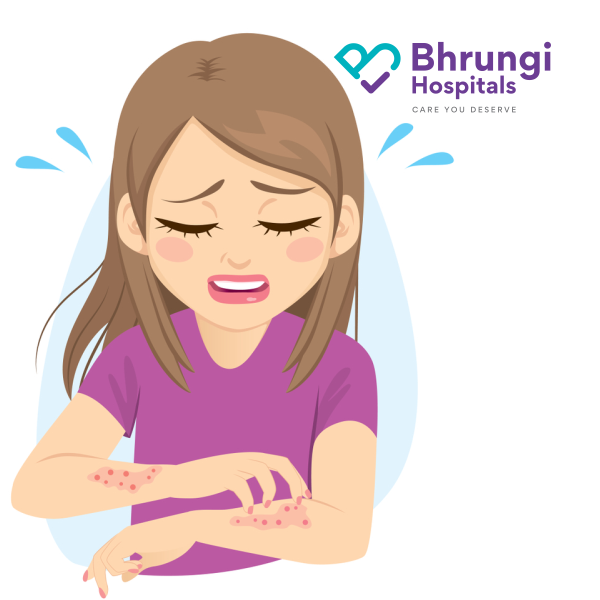
Often referred to as the “second brain,” our gut plays a pivotal role in overall health. Beyond digestion, it’s a powerhouse that influences our immune system, mood, and even cognitive function. When your gut is healthy, your body thrives. But when it’s not, it can manifest in surprising ways.
Understanding the importance of a healthy gut, we, at Bhrungi Hospital, want to equip you with the knowledge to recognize when your gut might be struggling and what you can do to fix it.
Here are 10 signs that your gut health may be compromised—and what you can do about it:
Frequent Bloating

Occasional bloating is normal, but persistent bloating or discomfort after meals could be a sign of poor digestion or an imbalance in gut bacteria. Frequent bloating, gas, diarrhoea or constipation are common signs of gut imbalance and can indicate underlying problems like irritable bowel syndrome (IBS) or food intolerances.
What to do: Keep a food journal to identify triggers and reduce processed foods. Probiotics can help rebalance your gut flora.
Chronic Constipation / Diarrhoea

Abdominal discomfort such as constant stomach cramps, chronic constipation or diarrhoea may point to an unhealthy gut microbiome or inflammation.
What to do: Increase fiber intake, stay hydrated and consult a gastroenterologist for relief from persistent or chronic issues.
Unexplained Weight Changes

Sudden weight gain or loss without dietary changes could result from a dysfunctional gut affecting your body’s ability to absorb nutrients and metabolism.
What to do: Focus on whole foods, manage stress and get a complete digestive health evaluation.
Skin Irritations

Skin flare-ups like eczema, rosacea and acne often stem from inflammation caused by poor gut health or food sensitivities.
What to do: An anti-inflammatory diet and gut-healing foods like fermented foods can help.
Food Intolerance
If you feel discomfort after eating dairy, gluten or certain foods, your gut lining may be compromised. Such sensitivities can signal gut permeability or dysbiosis.
What to do: Consult a dietician or nutritionist to identify and avoid triggers.
Sleep Problems

An unhealthy gut impacts nutrient absorption and can reduce serotonin production (which is essential for sleep and mood regulation) leading to fatigue, low energy and insomnia. Gut bacteria also produce neurotransmitters, and imbalances can affect energy production. The gut-brain connection influences sleep quality, and imbalances can lead to disruption in sleep pattern.
What to do: Avoid heavy meals at night and consider gut-friendly foods after consulting a nutritionist.
Low Immunity
70% of your immune system resides in your gut. If you have infections frequently, your gut may need attention.
What to do: Load up on immune-boosting foods like garlic, yogurt and nutrition-rich diet. A probiotic-rich diet supports immunity.
Bad Breath

A foul mouth odour or coating on the tongue, despite good oral hygiene, might point to poor digestion or gut dysbiosis. Bacterial imbalances can lead to the production of foul-smelling gases.
What to do: Tongue scraping and improved digestion (with enzymes or fermented foods) can help restore balance.
Mood Swings

There’s a reason why gut is often called second brain. Your gut and brain are deeply connected. Did you know that the gut and the brain are physically connected via nerves such as the Vagus Nerve, and chemically connected via neurotransmitters such as Serotonin (90% is produced in the gut). If you’re feeling emotionally drained, depressed or anxious, your gut could be the reason. Serotonin produced in the gut regulates mood.
What to do: Include omega-3, fermented foods and magnesium-rich leafy greens in your diet.
Autoimmune Conditions

Gut health plays a role in immune regulation. Imbalanced gut microbiome leads to leaky gut which in turn allows bacteria and toxins to enter our bloodstream. Inflammation then manifests into our body causing an immune response finally leading to auto immunity. Conditions like rheumatoid arthritis or thyroid issues often have gut-related triggers.
What to do: Work with a doctor to explore anti-inflammatory diets and gut healing protocols like removing gluten or sugar.
5 Simple Tips to Control Gut Imbalances
If you’re experiencing any of these symptoms, it is recommended to take the following steps:
- Consult a Gastroenterologist: A specialist can diagnose the underlying issue and recommend appropriate treatment.
- Hydration: Drink plenty of water to support digestion and gut health.
- Stress Management: Chronic stress can negatively impact gut health. Practice relaxation techniques like meditation or yoga.
- Improve Sleep Quality: Aim for 7-9 hours of quality sleep per night.
- Regular Exercise: Physical activity supports gut motility and reduces stress.

Bhrungi Hospital- Providing you Comprehensive and Coordinated Care That You Deserve
With a focus on holistic recovery, Bhrungi Hospital stands as a leader in high-quality emergency and critical care services in a patient-centered setting. Our integrated approach combines expertise, advanced technology, and compassionate care, focusing on safety and transparency while remaining affordable and accessible to all patients in need.
- ACLS Ambulance with free service within 10KMs radius
- Ventilator Ambulance service available
- Call +91 7845 108 108 anytime, any day
- 100+Beds Multispecialty Hospital
- 24×7 Emergency Care






